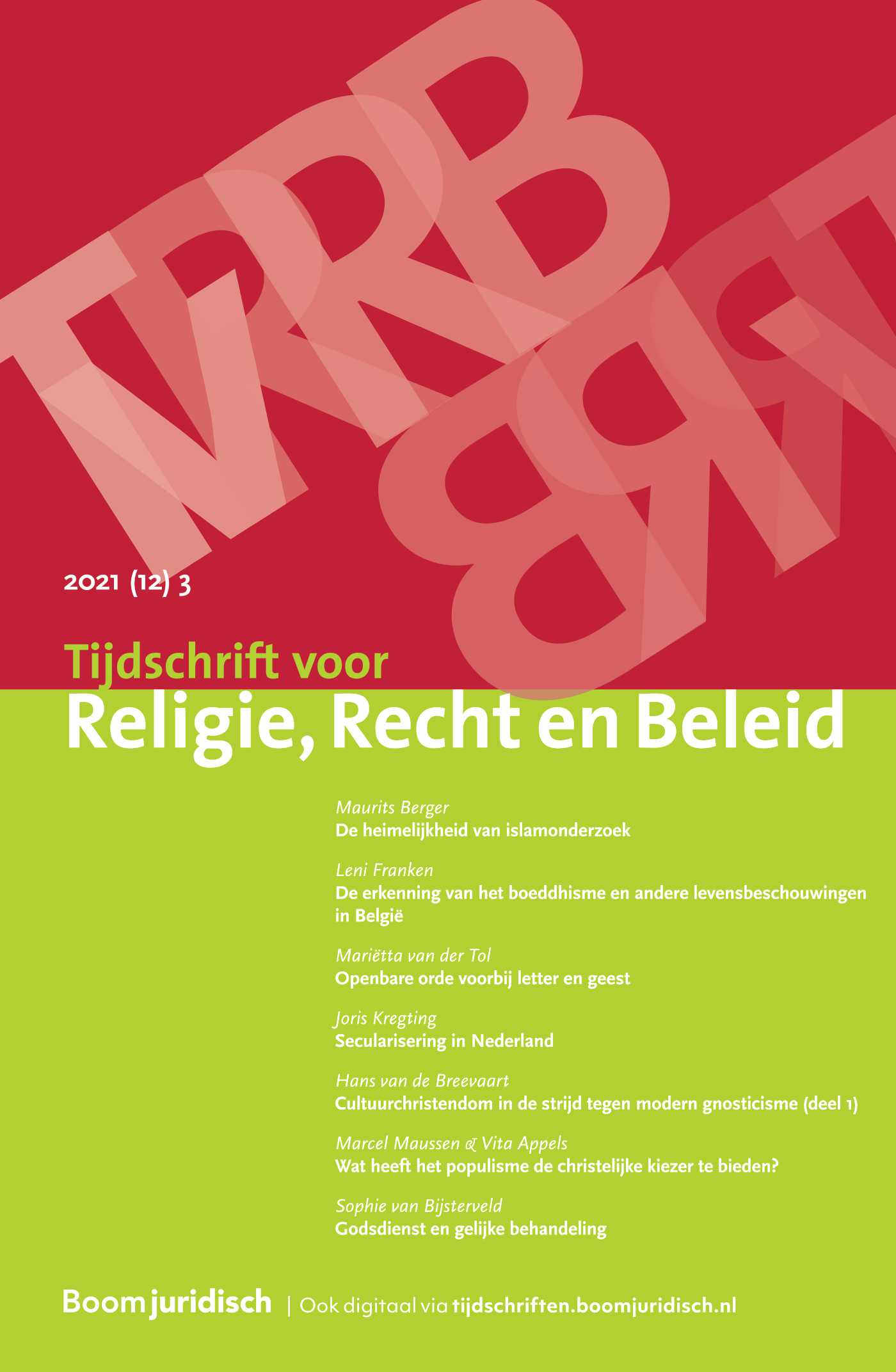|
How can a Christian be devoted to Jesus Christ and his kingdom, while being a good citizin of an earthly kingdom at the same time? Theologians like Bernhard Reitsma and John Howard Yoder argue that this is only possible when a Christian restrains from politics and power. Together with thinkers as Douglas J. Schuurman and John Calvin, this article has a more positive evaluation of the Christian impact on Western culture and encourages Christian responsibility. God does not leave his world alone, therefore Christians should also commit themselves to politics that wants to work on a peaceful society. It is the narrow way between apathy and lust for power. |


Tijdschrift voor Religie, Recht en Beleid
Meer op het gebied van Algemeen
Over dit tijdschriftMeld u zich hier aan voor de attendering op dit tijdschrift zodat u direct een mail ontvangt als er een nieuw digitaal nummer is verschenen en u de artikelen online kunt lezen.
| Redactioneel |
|
| Auteurs | Ben Koolen |
| Auteursinformatie |
| Artikel |
|
| Trefwoorden | politics, christian responsibility, power, religion |
| Auteurs | Gert-Jan Segers |
| SamenvattingAuteursinformatie |
| Artikel |
|
| Trefwoorden | recover phase, crisis, religious organizations |
| Auteurs | Marco Zannoni |
| SamenvattingAuteursinformatie |
|
In the recover phase following every disaster or crisis, the challenges are plenty. Government agencies and other organizations and individuals have to deal with activities ranging from medical care for victims, to judicial procedures and environmental cleaning. Religious organizations have important added value in providing spiritual and social care. They might provide necessary information to victims and others who are directly or indirectly affected by a crisis. This is something that needs to be recognized in both planning and recovery activities by local government. A correct diagnose of the recovery phase must include an analysis of the affected groups and the necessary stakeholders. |
| Artikel |
|
| Trefwoorden | disaster, memorial services, geestelijke zorg, interreligious |
| Auteurs | Klaas van der Kamp en Joop Albers |
| SamenvattingAuteursinformatie |
|
The government in the Netherlands struggles with the position of religion in public meetings. There is a lack of balance between a secularized vision on religion and the right of religious groups to show their feelings about God. Three national memorial services the last two years illustrate this, they were related to a crash of the Turkish Boeing 737 (2009), an incident at the birthday of Queen Beatrix (2009), and the crash of an airplane in Tripoli (2010). The Dutch government honours the victims in public meetings, but religion is supposed to be invisible. This should change in those circumstances that victims and their families do have specific religious feelings. |
| Artikel |
|
| Trefwoorden | general interest, ANBI-regime, freedom of religion |
| Auteurs | Richard Steenvoorde |
| SamenvattingAuteursinformatie |
|
Legislative changes with regard to tax exceptions for donations to civil society organisations have created a new fiscal regime (ANBI-regime). Central criterion within this new regime is whether the activities of an organisation are aimed at contributing to the general interest (algemeen belang). This regime poses serious questions for churches and their affiliated organisations as they are no longer de jure being considered as operating in the general interest. Furthermore, the legislator has not established a legal definition of ‘contributing to the general interest’. As a result a steady flow of jurisprudence has developed. In some judgements fiscal criteria seem to collide with the freedom of religion. |
| Artikel |
|
| Trefwoorden | Islam, Europe, policy, representative bodies |
| Auteurs | Jonathan Debeer, Patrick Loobuyck en Petra Meier |
| SamenvattingAuteursinformatie |
|
In the accommodation of Islam to Europe, policymakers are confronted with the secular identity of the Western-European democracies which, over time, has resulted in diverse church-state regimes serving to shield politics from religion and vice versa.In this article, we examine whether these regimes have resulted in differences concerning the coming together, shape and problems with which representative bodies for the Islamic faith are faced. To do this, we compare the Belgian, Dutch, French, German and English case.Though governments are bound to existing church-state regimes, we note a European trend that questions their influence on said bodies. |
| Artikel |
|
| Trefwoorden | church-state, subsidy |
| Auteurs | Stuart Mac Lean |
| SamenvattingAuteursinformatie |
|
Within municipalities there is much uncertainty as to whether religious organizations may be subsidized or not. It is often thought that the separation between church and state is at stake. Although legalists have addressed this problem before, a link with the everyday practice is often lacking. The flowchart that is created in this article makes a connection between legal science and practical questions policymakers are confronted with. By ‘pouring’ a subsidy request into the chart, it flows past three questions in a preset order. Based on research into (inter)national laws and jurisprudence, it is concluded that religious activities may be subsidized as long as the principles of neutrality, equality and separation between church and state are respected. |
| Artikel |
|
| Trefwoorden | Jan Donner |
| Auteurs | Ben Koolen |
| SamenvattingAuteursinformatie |
|
Provocative anti-religious articles and pictures in the communist newspaper De Tribune incited the Christian majority in the Netherlands’ Parliament in the early thirties of last century to penalizing blasphemy. Jan Donner, minister of Justice, convinced that legal proceedings in reference to blasphemy as such will not stand before court, introduced the crime of brutalizing believing people by mocking their God. |

 Aflevering 3
Aflevering 3